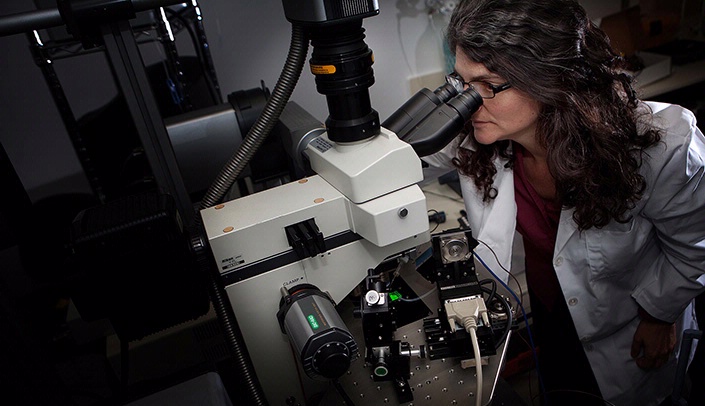For Anna Dunaevsky, Ph.D., it’s all about the brain.
Dr. Dunaevsky, an associate professor of developmental neuroscience, has always been fascinated by the brain – specifically “how this complex structure is developed.”
From there, it was a short step to connect behavioral changes with structural development and actual cellular events. That step became inevitable when she joined the Munroe-Meyer Institute, where she took an interest in questions related to neurodevelopmental disorders.
One of those questions – the effects of maternal inflammation on developmental disabilities, specifically autism – led to Dr. Dunaevsky’s four-year, $1.5 million grant from the National Institute of Mental Health for a project titled “Maternal Immune Activation in a Genetic Mouse Model of Autism Spectrum Disorder.”
The project explores maternal infections during pregnancies as a risk factor that increases the chance of offspring developing autism.
Dr. Dunaevsky is building on three lines of evidence:
- Research has shown that infection during the first or second trimester, either viral or bacterial, is a risk factor for autism.
- There is evidence that autistic patients show increased levels of such inflammatory molecules as cytokines.
- Animal studies have shown that when inflammation is induced in a pregnant mother, offspring display various behavioral alterations that are relevant to autism – reduced ultrasonic vocalization, which is a form of communication, increased repetitive behavior, and reduced social interaction – that suggest changes in the brain.
“All of that has led us to suggest that maternal immune activation, which is what we call this model, leads to alterations in development of synapses, the connections between neurons.”
Dr. Dunaevsky continues work that was initially funded by the Nebraska Research Initiative and the Department of Defense.
“We found that impairments in synapses – in terms of numbers and function – correlate with the behavioral deficits that we see,” she said.
Importantly, Dr. Dunaevsky and her team found that, where there is an increased inflammatory state in the brain of the mouse offspring, a two-week anti-inflammatory treatment led to reversal of the synaptic impairments and some of the behavioral impairments in young mice.
“In adult mice, that early, short-term treatment had some beneficial effect, but it didn’t completely reverse the impairments,” she said.
“There are many mothers who get sick during pregnancy and their children do not develop autism,” Dr. Dunaevsky said. “And of course, there is plenty of genetic evidence for involvement of neuronal genes in autism, so just immune activation is not the entire story. It’s therefore likely that interactions with genetic risk factors are involved.”
That is the focus of the new project – to explore the genetic risk factors in combination with environmental risk factors.
“That component of the anti-inflammatory treatment was surprising to us, how effective it was in mice,” she said. “So with this new grant, we’re going to use this approach as well.”
